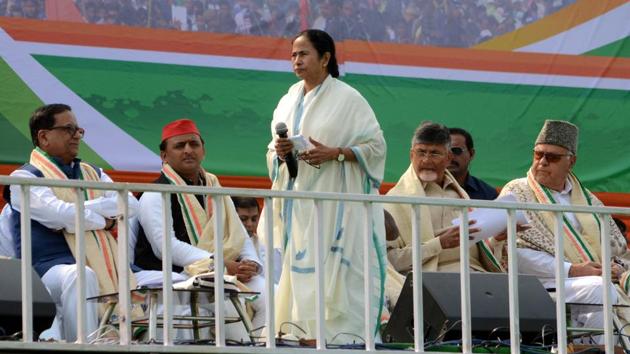Political fights are turning personal
The constant trading of charges seems to have made the discourse go completely off the rails.
Political manuscripts are often written in a clandestine manner. The seeds of thoughts are sown by someone, they sprout somewhere else and no one knows until the harvest who will actually get the produce. Last week, when the leaders of the major opposition parties gathered at Nationalist Congress Party (NCP) Sharad Pawar’s house in Delhi, journalists covering the event had no idea that this would involve some breaking news.

After a while, the opposition leaders addressed the media and announced the drafting of a Common Minimum Programme (CMP) to get rid of the Narendra Modi government. Although this announcement was made late on Wednesday night, preparations for it have been underway for a long time. It was clear from the way the opposition parties came together in Kolkata for chief minister Mamata Banerjee’s public meeting that the mobilisation against the Modi government had begun. After the Kolkata meeting, Andhra Pradesh chief minister Chandrababu Naidu came to Delhi on February 11 and went on a day-long hunger strike to demand special status for the state.
All those who had come together in Kolkata supported him too. After three days, Delhi chief minister Arvind Kejriwal organised a tanashahi hatao, desh bachao rally in Delhi. The opposition leaders supported him too. In Kolkata, the CPM did not support the rally organised by Banerjee, but the Left leaders were present at the Delhi rally until Banerjee arrived. Is it a mere coincidence? No, there is nothing without purpose in politics. It would seem that the opposition is apprehensive, thanks to failures of the Janata Party in 1977, the Janata Dal in 1989, and repeated problems with the third front. Naturally, they are now treading cautiously. They usually express a collective commitment on certain issues, but whenever a particular party focuses on its political interests in its home state, then the game changes. The Congress and the Samajwadi Party-Bahujan Samaj Party (SP-BSP) coalition attended the rally in Kolkata together but they continue to be rivals in Uttar Pradesh. The Telugu Desam Party (TDP) and the Congress contested elections together in Telangana but have decided to contest the Lok Sabha elections separately.
After the meeting at Pawar’s house, Banerjee announced that the opposition along with drafting a CMP will decide on the distribution of seats before general elections. But the opposition must cross many hurdles before they reach that stage. It was perhaps because of this that the Congress president, Rahul Gandhi, later clarified that they have not reached an agreement on contesting elections together in Delhi and West Bengal. The absence of any SP representative was the subject of much debate.
The main reason for this was a speech given by SP veteran Mulayam Singh Yadav on the last day of Lok Sabha. He praised Modi, and even expressed the wish that he should get a second term. This statement caused a sensation in Delhi’s political circles. The SP spokesperson tried to downplay it, but the BJP had already hijacked the show. Enthusiastic BJP workers even put up posters in Lucknow highlighting Mulayam Singh Yadav’s statement.
The BJP leaders are using every platform to ask this question: Who do these parties, which have a history of fighting with each other, consider their leader? We have Modi.
If the parties have not reached a consensus on their electoral agenda, then why create all this noise? This question has two answers. First, the aggression of Modi-Shah has scared them. Second, in the last few months, the manner in which questions have been raised about constitutional institutions, including the Supreme Court and the Central Bureau of Investigation, has made them apprehensive. The opposition leaders feel by the BJP is trying to destroy them using these institutions. That is why they are putting up a show of solidarity despite doubts and differences.
Undoubtedly, these institutions are integral to the effective and efficient functioning of a democracy. It is necessary to have a government which protects the dignity and integrity of these institutions. Over the years, no one really paid attention to the undermining of these institutions. This is worrying as an independent judiciary and competent institutions are the bedrock of any democracy. Why can’t our political leaders promise the voters that with the formation of the next Lok Sabha, meaningful steps will be taken in this regard?
As the 2019 general elections draw close, the political fights seem to be turning personal. This seems to have made the political discourse go completely off the rails. We are expressing our thoughts more on inconsequential aspects of our leaders’ lives than on serious issues. Is this appropriate for the largest democracy in the world?
Our leaders who are relentless in their pursuit of power should do some serious introspection about their vision for the country. If they have a right to win elections by employing various techniques and plans, then it’s their duty to be accountable and transparent to the public.
Shashi Shekhar is editor-in-chief, Hindustan
letters@hindustantimes.com



